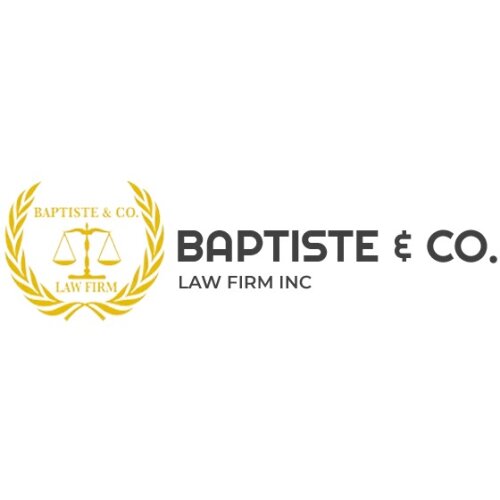Best Collaborative Law Lawyers in Saint Vincent and the Grenadines
Share your needs with us, get contacted by law firms.
Free. Takes 2 min.
Free Guide to Hiring a Family Lawyer
Or refine your search by selecting a city:
List of the best lawyers in Saint Vincent and the Grenadines
About Collaborative Law in Saint Vincent and the Grenadines
Collaborative Law is an alternative dispute resolution process that focuses on helping parties resolve disputes in a cooperative and non-adversarial manner. In Saint Vincent and the Grenadines, Collaborative Law is gaining recognition as a constructive way to handle legal conflicts, particularly in family law matters such as divorce, child custody, and property division. This approach seeks to minimize the emotional and financial strain often associated with traditional litigation by fostering open communication and mutual respect among all parties involved.
Why You May Need a Lawyer
There are several situations where you might need legal assistance in Collaborative Law:
- Divorce and separation: To reach amicable agreements on asset division, child custody, and spousal support.
- Child custody and visitation: To develop cooperative parenting plans that prioritize the best interests of the children.
- Property disputes: To resolve property ownership and usage conflicts in a mutually beneficial manner.
- Business partnerships: To negotiate and mediate disputes that could affect the future of a business venture.
- Elder law: To address family disagreements about elder care and estate planning collaboratively.
Local Laws Overview
Understanding the local laws regarding Collaborative Law in Saint Vincent and the Grenadines is crucial for a successful resolution process. Key aspects include:
- Family Law Act: Governs legal procedures related to divorce, custody, and spousal support, emphasizing the best interests of children and equitable treatment of both parties.
- Mediation and Dispute Resolution Act: Provides the framework for alternative dispute resolution methods, including Collaborative Law, to settle conflicts outside the court system.
- Legal Profession Act: Regulates the conduct and responsibilities of lawyers in Saint Vincent and the Grenadines, ensuring that they adhere to ethical standards during collaborative processes.
Frequently Asked Questions
What is Collaborative Law?
Collaborative Law is a legal process that enables parties to resolve disputes amicably by working together with their lawyers and other professionals, without going to court.
How does Collaborative Law differ from traditional litigation?
Unlike traditional litigation, Collaborative Law focuses on mutual solutions rather than adversarial battles, aiming to reach agreements that benefit all parties involved.
Is Collaborative Law suitable for all types of disputes?
While it's particularly effective for family law matters, Collaborative Law can also be used for business disputes, property conflicts, and other civil matters where parties seek cooperative resolutions.
How can a Collaborative Lawyer help me?
A Collaborative Lawyer will guide you through the process, facilitate open communication, and work with the opposing party to reach an amicable settlement that meets everyone’s needs.
Are the agreements reached in Collaborative Law binding?
Yes, agreements reached through the Collaborative Law process are legally binding, provided they are documented correctly and approved by the court if necessary.
What happens if we cannot reach an agreement through Collaborative Law?
If an agreement cannot be reached, the collaborative process is terminated, and the parties may then choose to pursue traditional litigation. However, the collaborative lawyers cannot represent the parties in court.
How long does the Collaborative Law process take?
The duration of the collaborative process depends on the complexity of the issues and the willingness of the parties to cooperate. It can take several weeks to several months to reach a resolution.
What are the costs associated with Collaborative Law?
While the costs can vary, Collaborative Law is typically less expensive than traditional litigation due to its cooperative nature and avoidance of lengthy court procedures.
Can children be involved in the Collaborative Law process?
Yes, the children's best interests are a primary focus in family law disputes, and their needs and views can be considered during the collaborative discussions.
Is Collaborative Law confidential?
Yes, the collaborative process is confidential, and all communications during the process are protected, encouraging open and honest discussions.
Additional Resources
Here are some resources that may be useful for those seeking legal advice in Collaborative Law:
- The Bar Association of Saint Vincent and the Grenadines: Provides information and assistance in finding qualified Collaborative Lawyers.
- The Ministry of Legal Affairs: Offers resources and publications on family law and alternative dispute resolution.
- Community Mediation Centers: Provide mediation services and can guide you through the collaborative process.
Next Steps
If you need legal assistance in Collaborative Law, consider the following steps:
- Identify your legal needs and goals: Understand what you want to achieve through the collaborative process.
- Find a qualified Collaborative Lawyer: Contact the Bar Association or local legal professionals specializing in Collaborative Law.
- Schedule a consultation: Discuss your situation, explore your options, and determine if Collaborative Law is suitable for your case.
- Prepare for the process: Gather all necessary documents and information, and be ready to engage in open and respectful discussions.
- Participate actively: Be involved in the meetings and collaborate with your lawyer and the opposing party to reach a mutually beneficial agreement.
By following these steps and seeking professional guidance, you can navigate the collaborative process effectively and work towards a resolution that meets everyone’s needs.
Lawzana helps you find the best lawyers and law firms in Saint Vincent and the Grenadines through a curated and pre-screened list of qualified legal professionals. Our platform offers rankings and detailed profiles of attorneys and law firms, allowing you to compare based on practice areas, including Collaborative Law, experience, and client feedback.
Each profile includes a description of the firm's areas of practice, client reviews, team members and partners, year of establishment, spoken languages, office locations, contact information, social media presence, and any published articles or resources. Most firms on our platform speak English and are experienced in both local and international legal matters.
Get a quote from top-rated law firms in Saint Vincent and the Grenadines — quickly, securely, and without unnecessary hassle.
Disclaimer:
The information provided on this page is for general informational purposes only and does not constitute legal advice. While we strive to ensure the accuracy and relevance of the content, legal information may change over time, and interpretations of the law can vary. You should always consult with a qualified legal professional for advice specific to your situation.
We disclaim all liability for actions taken or not taken based on the content of this page. If you believe any information is incorrect or outdated, please contact us, and we will review and update it where appropriate.
Browse collaborative law law firms by city in Saint Vincent and the Grenadines
Refine your search by selecting a city.












